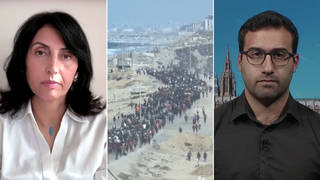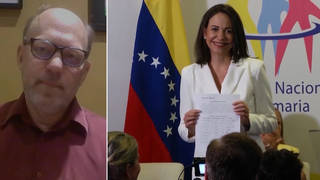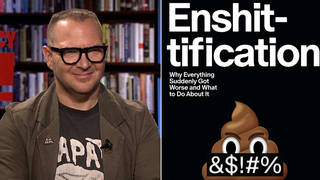
Guests
- Bill McKibbenco-founder of 350.org. He’s the author of several books, including Eaarth: Making a Life on a Tough New Planet. His recent article for The New York Times is titled “Why Dakota is the New Keystone.” Tonight, he will deliver the inaugural speech of the Jonathan Schell Memorial Lecture Series on the Fate of the Earth at The New School here in New York.
On the same day Donald Trump was elected, the World Meteorological Organization reported that the five years from 2011 to 2015 were the hottest on record, with hundreds of thousands of deaths likely due to global warming from human activity. The report found human-induced climate change was directly linked to extreme events, including an East African drought and famine in 2011 that claimed over a quarter-million lives, and “Superstorm” Sandy in the U.S. that caused $67 billion of damage in 2012. Delegates at the United Nations climate summit in Marrakech, Morocco, are expressing panic over Tuesday’s election results, saying President-elect Donald Trump may threaten the future of any international agreement to slow catastrophic climate change. Trump has said he will “cancel the Paris Climate Agreement and stop all payments of U.S. tax dollars to U.N. global warming programs.” Trump has also promised to promote coal power and fracking, and says he will allow for oil and gas drilling on federal lands. He has also promised to ask TransCanada to renew its permit application for the Keystone XL pipeline. For more, we’re joined by Bill McKibben, co-founder of 350.org. He’s the author of several books, including “Eaarth: Making a Life on a Tough New Planet.” His recent article for The New York Times is titled “Why Dakota is the New Keystone.”
Transcript
NERMEEN SHAIKH: Delegates at the United Nations climate summit in Marrakech, Morocco, are expressing panic over Tuesday’s election results, saying President-elect Donald Trump may threaten the future of any international agreement to slow catastrophic climate change. Trump has said he will, quote, “cancel the Paris Climate Agreement and stop all payments of U.S. tax dollars to U.N. global warming programs,” end-quote. Trump has also promised to promote coal power and fracking, and says he will allow for oil and gas drilling on federal lands. He has also promised to ask TransCanada to renew its permit application for the Keystone XL pipeline.
On the same day Trump was elected, the World Meteorological Organization reported that the five years from 2011 to 2015 were the hottest on record, with hundreds of thousands of deaths likely due to global warming from human activity. The report found human-induced climate change was directly linked to extreme events, including an East African drought and famine in 2011 that claimed over a quarter-million lives, and Superstorm Sandy in the U.S., that caused $67 billion of damage in 2012.
AMY GOODMAN: Joining us now, Bill McKibben, co-founder of 350.org, the author of a number of books, including Eaarth: Making a Life on a Tough New Planet, his recent article in The New York Times headlined “Why Dakota is the New Keystone.” Tonight he’ll deliver the inaugural speech of the Jonathan Schell Memorial Lecture Series on the Fate of the Earth at The New School here in New York.
It’s great to have you with us, Bill.
BILL McKIBBEN: As always, Amy.
AMY GOODMAN: Your response to the election of Donald Trump?
BILL McKIBBEN: It’s been a very strange political year for me. I don’t generally engage that much in electoral politics, but, you know, Bernie asked me to introduce him the day that he announced for office. And I spent a lot of time out on the campaign trail.
AMY GOODMAN: Bernie asked you to introduce Bernie.
BILL McKIBBEN: Exactly, to introduce him the day he announced. And I got to spend a lot of time with him out on the campaign trail. And it was remarkable, because we were reminded of what an actual political crusader looks like, and we saw the enthusiasm with which he was met. And then he lost. And the Democratic Party elites, that Glenn was describing, kind of took over. And then they managed to lose to the person who is, in every possible way, the kind of opposite of Bernie. So, it’s a difficult moment for everybody. Everybody is obviously in a kind of—still in a—somewhat in a state of shock. But there are real lessons to be taken from it. And one of them is that people who engage with the public, people who tell stories, who understand the world in real terms, those are the people who are going to be successful, whether they’re good or they’re bad.
NERMEEN SHAIKH: Bill, you’ve also said that the damage from this election will be measured in geologic time.
BILL McKIBBEN: That’s right. The Trump presidency comes at a moment when we could least afford it. It’s not like we were winning the climate battle before, you know, but we were beginning to make at least a little progress. There was beginning to be the kind of ramp-up of renewable and clean energy in this country and around the world. The world managed a year ago at Paris to do something, anyway, for the first time, about climate change. Now we’re going to hit not a pothole, but a ditch in the road. And it’s not as if—I mean, the thing to remember about climate change is it’s not as if we can just pick up four years from now where we left off. Physics is our enemy, and it imposes a difficult time limit here. We don’t have any more presidential terms to waste. So we’re going to have to figure out, as a nation and, maybe more importantly, as a planet, how to work around Trump, to one degree or another.
AMY GOODMAN: So let’s go to Donald Trump, who appeared last year on The Hugh Hewitt Show and was asked about global warming.
HUGH HEWITT: Do you believe that the temperature of the Earth is increasing? And what would you do, if you do believe that, vis-à-vis global climate change?
DONALD TRUMP: Well, first of all, I’m not a believer in global warming. I’m not a believer in man-made global warming. It could be warming, and it’s going to start to cool at some point. And, you know, in the early—in the 1920s, people talked about global cooling. I don’t know if you know that or not. They thought the Earth was cooling. Now it’s global warming. And actually, we’ve had times where the weather wasn’t working out, so they changed it to “extreme weather,” and they have all different names, you know, so that it fits the bill.
AMY GOODMAN: And in December, Donald Trump was asked a similar question by Bill O’Reilly.
BILL O’REILLY: Do you believe in global warming, climate change? Do you think the world’s going to change for the worse because it’s getting warmer?
DONALD TRUMP: I think that there’ll be little change here. It’ll go up, it’ll get a little cooler, it’ll get a little warmer, like it always has for millions of years. It’ll get cooler, it’ll get warmer. It’s called weather. I do believe in clean—and I’ve received—a lot of people don’t know this: I’ve received many environmental awards, many, many environmental awards, for the work I do. And I believe strongly in clean water and clean air. But I don’t believe that what they say—I think it’s a big scam for a lot of people to make a lot of money.
AMY GOODMAN: That’s Donald Trump saying that the whole issue of climate change, a big scam for a lot of people to make a lot of money. And he tweeted, “The concept of global warming was created by and for the Chinese in order to make U.S. manufacturing non-competitive.” So, Bill McKibben?
BILL McKIBBEN: Well, what is there to say? I mean, he’s—he’s—
AMY GOODMAN: Well, there has to be a lot to say in these next four years.
BILL McKIBBEN: He’s as wrong on this as he is on so many other things. In this case, unlike some of the things on which he’s wrong, which are a matter of opinion that one can—whether immigrants are good for an economy—this one is a matter of just plain hard, physical fact. And so, it’s going to find him out. I mean, we’re going to continue to see the increase in disasters, that we’ve been dealing with already, during his four years. And it’s going to be incumbent upon the rest of us to make sure that those stories tell, that people understand what’s going on and they understand the reckless disregard of our administration.
AMY GOODMAN: And what does it matter if you have a climate denier in the White House? How do you deal with that?
BILL McKIBBEN: Well, it matters because every single decision that’s going to be made around energy and climate should be made, at this point, with a very firm weather eye on global warming, and none of them will be. We’re going to be in an era of unrestrained license for the fossil fuel industry. An industry that a week ago was back on it heels is now back in the saddle. And it’s going to take an immense amount of movement building and organizing to slow them down.
NERMEEN SHAIKH: Well, could you talk a little bit about the people who are advising Trump on climate-related issues, on the environment? There’s Myron Ebell, who’s running the EPA working group on Trump’s transition team, and he’s also, of course, a climate skeptic.
BILL McKIBBEN: He comes from the Competitive Enterprise Institute, and he’s made a career out of climate denial—and, I imagine, a successful career. And I imagine it will get only more successful.
What we know from investigative reporting in the last year is that there’s nothing new about this. I mean, Exxon knew everything there was to know about climate change 35 years ago, and helped build this web of climate denial. We’d almost begun to really bust through it in the last few years. We were even able to get President Obama, who in his first term did virtually nothing about this, to finally begin to take some steps. Now we’re back to ground zero in this battle. The only thing that’s still moving fast is the rate of carbon increase in the atmosphere and the temperature that it’s driving.
We’re going to have to take those stories and turn them into powerful organizing opportunities. And we can. I mean, the most remarkable story going on any place in America right now is the one that you’ve been documenting from Standing Rock in the Dakotas. It’s the absolute, all-time story of small versus big, of ancient depression and modern possibility of the people who have been most oppressed on this continent. But it’s a story that we couldn’t get Hillary Clinton to tell in the campaign. We couldn’t get her to say anything about what was going on in the Dakotas. That’s, as Glenn was saying earlier, part and parcel of the reason that she lost. And so, we need a new kind of—I don’t know whether it’s a Democratic Party or a new kind of opposition, that’s able to take those stories, those moments, and help people understand the actual contours in the world, not the fake contours that Donald Trump describes, to some effect.
AMY GOODMAN: So you just came back from Standing Rock. We’re talking about the $3.8 billion Dakota Access pipeline that would take fracked oil from the Bakken oilfields through North and South Dakota, go through Iowa, then to Illinois. Just recently, President Obama said the U.S. Army Corps of Engineers is considering rerouting the pipeline amidst the months of resistance from the Standing Rock Sioux Tribe and members of more than 200 indigenous nations across the Americas, as well as their non-Native allies. This is what he said.
PRESIDENT BARACK OBAMA: My view is that there is a way for us to accommodate sacred lands of Native Americans. And I think that right now the Army Corps is examining whether there are ways to reroute this pipeline in a way.
VERSHA SHARMA: So that’s a possibility, right?
PRESIDENT BARACK OBAMA: So—so, we’re going to let it play out for several more weeks and determine whether or not this can be resolved in a way that I think is properly attentive to the traditions of the first Americans.
AMY GOODMAN: So, that was an interview President Obama did with NowThis News. We don’t have much time. He said we’re going to let this play out for a few weeks. That was a few weeks ago.
BILL McKIBBEN: Yeah. Tuesday, November 15th, there will be demonstrations in more than a hundred American cities at Army Corps of Engineers offices, demanding that the president, on his way out, do the right thing here. Who knows whether the Corps denying a permit will stick in the new Trump administration? We don’t know. All we can control for the moment is what happens in the next little while. And it’s time for President Obama to do more than say, “We’ll let this play out.” It’s time for him, while he’s still got some power, to exercise that power. If people go to NoDAPLDayOfAction.org, they can find out where those protests are taking place.
AMY GOODMAN: And now, Energy Transfer Partners, the company that owns the Dakota Access pipeline, says they are poised to bore under the Missouri River. It’s very unclear what this means, considering they don’t yet have a permit for it. You talk about it in The New York Times, a piece you just wrote, as the Keystone XL of our time, which also Donald Trump will be pushing for. But President Obama has not stopped this yet and seems to have the power to.
BILL McKIBBEN: He could, at least for 70 days, keep them from drilling under the Missouri River. And at the very least, that would be a powerful symbolic statement and one that people will rally around. There aren’t very many Americans, even in Trump’s America, who don’t understand the shamefulness of how we have treated the original inhabitants of this continent. This is the kind of issue that people have to get behind. They’re moral issues that define who we are.
AMY GOODMAN: Well, Bill McKibben, we are going to do Part 2 of our conversation after the show and post it online at democracynow.org. Congratulations on your address tonight at The New School.
BILL McKIBBEN: It will be good to be thinking of Jonathan Schell, who was a—one of America’s greatest writers and a person whose counsel would have been useful in the Trump era.
AMY GOODMAN: Bill McKibben will be speaking at The New School tonight, giving the Jonathan Schell Memorial Lecture. Bill McKibben, co-founder of 350.org, among his books, _Eaarth: Making a Life on a Tough New Planet.” And we’ll link to his piece in The New York Times, “Why Dakota is the New Keystone.” In 2014, Bill McKibben was awarded the Right Livelihood Prize, sometimes called the Alternative Nobel, for his environmental activism.











Media Options